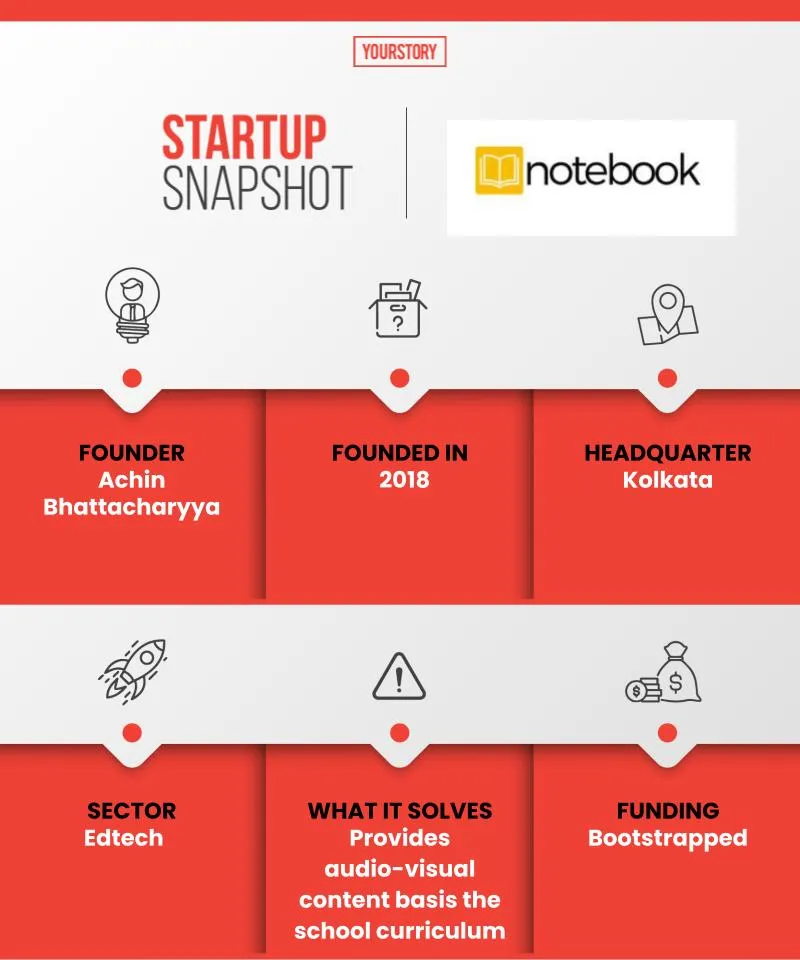Why this Deloitte Director chose to start up in the edtech space after visiting a remote village in Andhra Pradesh
Kolkata-based Notebook is an online platform that provides educational audio-visual content linked to every topic in the school curriculum, as a teaching aid, and also accessible by students from home.
In January 2018, Achin Bhattacharyya, after taking a sabbatical from his role as Director, Deloitte, was visiting Gooty, a small village in Andhra Pradesh. A building that looked like a storage space for construction material caught his eye. On further investigation, Achin realised it was a school.
“It was a weekday, and still I couldn’t see any teachers or students or classes taking place. However, a few feet away from me, three teenage boys were looking at a smartphone, excitedly, watching a music video on YouTube. I think that, for me, was the eureka moment,” says Achin.
He already was curious about the edtech space. A father of two young children, by 2017, when Achin took his sabbatical, started hearing a lot about the reach of online learning.
Travelling across India and abroad for a year, it became clear to Achin that there were needs in this space not being addressed by the current set of solutions.
He started Notebook in 2019 in Kolkata. The online platform provides educational audio-visual content linked to every topic in the school curriculum, in a way that teachers can use as a teaching aid, and students can access to learn from home.

The focus on access
While the eureka moment was triggered by his visit to Gooty, Achin explains it was the culmination of years of a subconscious discomfort with the inability to have education reach the lowest strata of our society that led to the founding of Notebook.
“It has always bothered me while our education system churns out global leaders, we have been unable to solve for universal access. It was out of these thoughts that Notebook was born. It was an endeavour to leverage technology to make high quality educational content universally accessible, relevant and affordable,” explains Achin.
Notebook is also accessible by disabled students due to its video-content. Additionally, due to its output user interface - Notebook is accessible in places even with slower internet speeds.
The team adopted a Google cloud-based architecture with the same streaming backbone as YouTube to be available across all devices. Achin says the team also set out to create a pedagogy that handheld a student on a journey from completely Indic languages to completely English with transition stages in between.
“In a country with a per capita income of about Rs 11,000, products seemed consistently pegged at a minimum upfront spend of Rs 18,000. We had to meet the costs of delivering high quality content, but as professionals, we knew there was a financial model possible to reduce the burden on the parents,” he adds.

Building the team
The team decided to offer a monthly subscription pricing model starting off publicity mostly through word-of-mouth. The one challenge that was a curveball for everyone, including Notebook, was the COVID-19 pandemic.
“We had to pivot from the school licence model for the time-being, but I can’t complain because of the kind of validation this period has provided us. While the Indian parent had largely considered the tuition classes a need and edtech an indulgence, this period has flipped the equation on its head,” says Achin.
Currently, Notebook has a team of over 250 professionals working in various capacities to create engaging audio-visual content and other initiatives.
Notebook is also supported by a strong advisory council, which includes Philip Burrett (ex-Deputy Headmaster, The Doon School), Major General Neeraj Bali, Sena Medal (Retd.) and Dr Minakhi Das, Ex-Controller of Examinations, Board of Secondary Education, Odisha.
Achin roped in Subhayu Roy and Abhishek Dutta as co-founders. Subhayu was heading Content Distribution across South Asia for Perform Group – a British Sports content company. Abhishek Dutta was Vice President at Genpact India with two school-going daughters.
How does it work?
It all starts from the syllabus. Being mapped to the curriculum is core to Notebook’s design. Based on this, topics are linked according to subject, complexity, age-appropriateness, etc.
The list is then handed over to a research team who go through available literature, notes, other content sources to arrive at the highest density module for the topic, in the least duration and offering maximum value in terms of learning. This goes to the scripting team, who are storytellers.
They build the narrative around the module, which is then shot in the studio with an instructor, while a team of artists work on hand drawn illustrations for the video. A music director chooses the sound effects and background music to go with the module. When all this is done, the footage, art. and music are stitched together into the video.
Once a video is made, it is shared with a focus group of teachers, students and subject experts. Their feedback helps the team ensure a constant state of improvement. Once the focus group approves of a content video, only then, it is uploaded to the Cloud.
The teacher, before taking a class, has access to this video on any internet capable device. They can also share a link to the video with the students a day prior to the class and ask them to come prepared with a written summary.
“When the class begins, the teacher can play the short video and then proceed. Given the preparation and the common understanding in the class, the discussions are far more enriching. This is in line with the ‘flipped-classroom’ pedagogy that is being followed in many countries for a while now,” says Achin.
When the student chooses to revise the topic, they can open the video on their device, and learn the lesson. Besides the lesson videos, every topic also has an ‘Interest Builder’ section as an introduction and is followed by a short recap and Q&A videos to maximise learning outcomes.
“Technologically, DRM protects against unauthorised copying of content, and dynamic transcoding into multiple bitrates enables buffer-free experience even on lower bandwidth connections,” he adds.

The numbers and revenue
The team says it has served over 1.71 million users as of mid-October 2020. The platform had over 300,000 users before the lockdown and this increased 1.32 million in just four months.
“We had partnered with schools to enable licences from April 2020. However, the COVID-19 pandemic changed our plans a bit. To help all schools and students, we have kept Notebook free to access for now. It will completely shift to a subscription-only model by the end of October,” says Achin.
Apart from the storytelling and videos, the team offers a strong focus across subjects with easy access. It also provides individual level analytics.
Notebook is available at a price of Rs 1,999 for all subjects for a month and Rs 9,999 for an annual subscription with unlimited access. Besides students and teachers, Notebook has partnered with the likes of BSNL, Aflatoun International, Pratham, Save the Children and Johnson & Johnson. These partnerships also contribute to the business.
Market and future
A report by RedSeer and Omidyar Network India says the coronavirus pandemic has proved to be one of the biggest game-changers for India’s edtech sector. Online education offerings for Classes 1 to 12 are projected to increase 6.3 times by 2022, creating a $1.7 billion market. The other edtech players in the space include Cunomial Technologies, , , , and others.
The average fixed cost of creating content for a chapter ranges between Rs 7 lakh and approximately Rs 15 lakh, depending on the class as well as the complexity. There is a marginal variable cost as well for streaming of the content. Notebook is currently bootstrapped.
The team is looking to add 14 more state board curricula, more subjects and topics, and are continuously working to improve existing content based on user and focus group feedback.
Notebook is also looking at launching an intelligence assessment platform. “We are working with a team of data scientists from Yale to develop an intelligent assessment portal that takes into account a student’s behavioural patterns while on the product, as well as subjective responses to questions,” says Achin.
Edited by Rekha Balakrishnan




![[Product Roadmap] Started with 100 loans a month, how StashFin grew to process 150 loans an hour](https://images.yourstory.com/cs/2/a9efa9c02dd911e9adc52d913c55075e/PRM2-1606900430487.png?fm=png&auto=format&h=100&w=100&crop=entropy&fit=crop)
![[YS Learn] The Vedantu story: How a non-techie built and scaled an edtech startup](https://images.yourstory.com/cs/2/a9efa9c02dd911e9adc52d913c55075e/Imagepkrp-1607259672872.jpg?fm=png&auto=format&h=100&w=100&crop=entropy&fit=crop)




